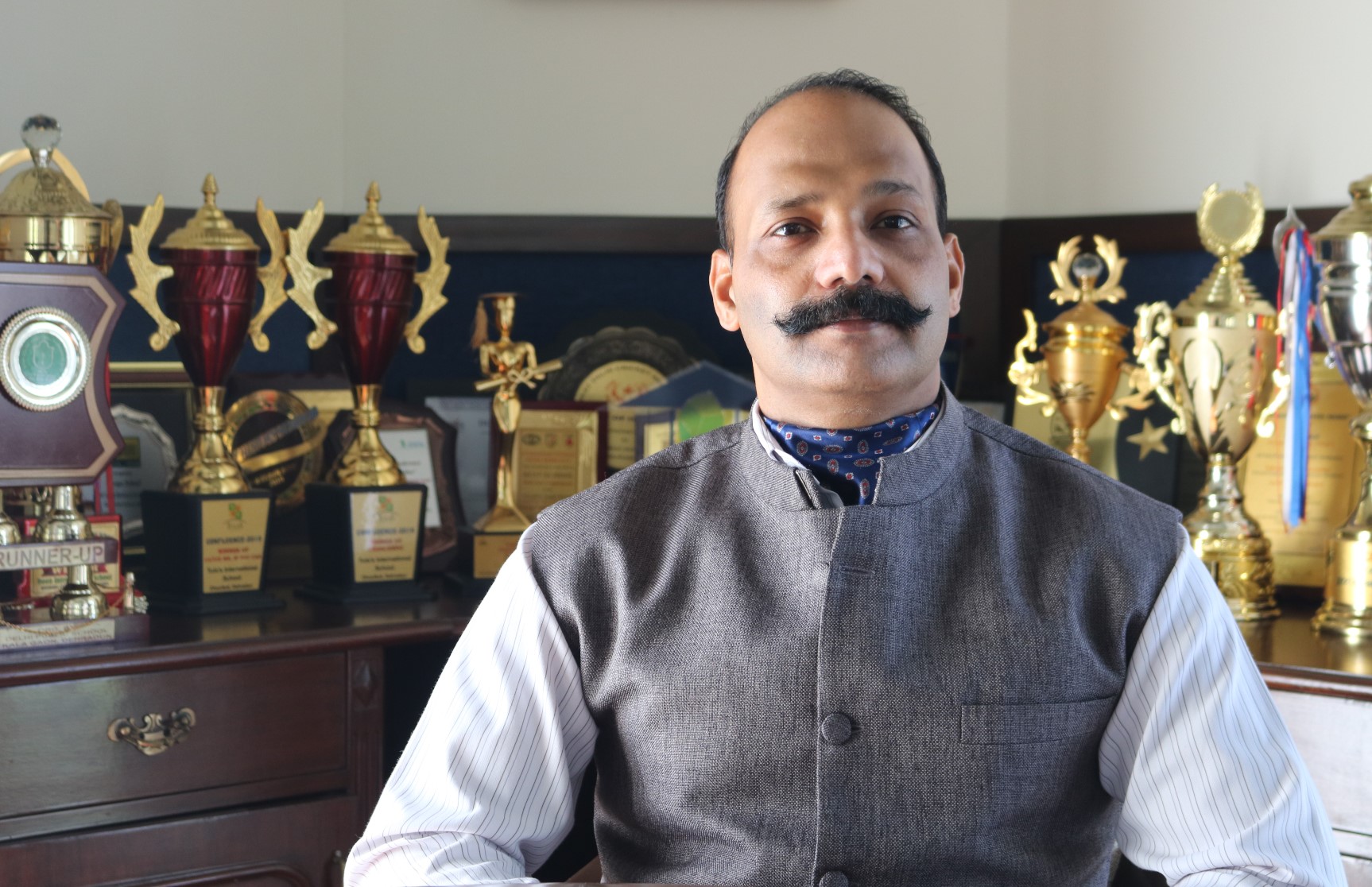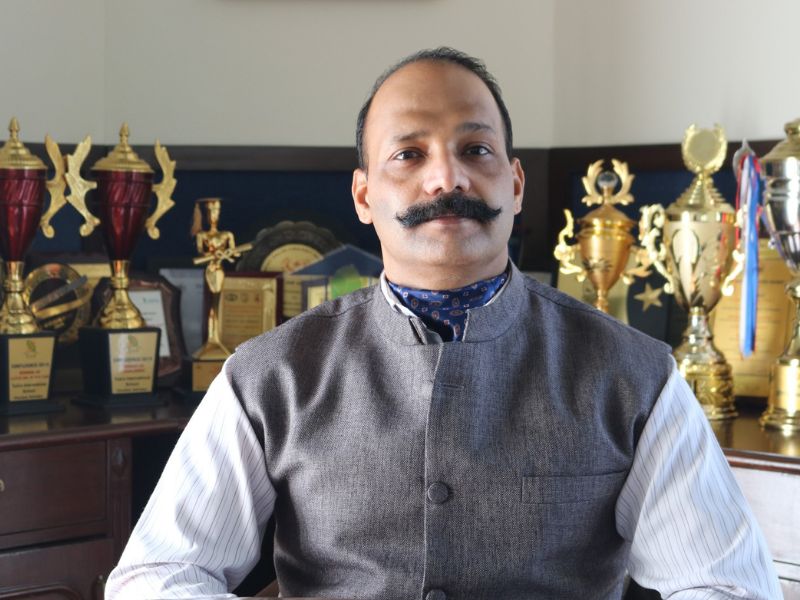

Who we are and why we are on this planet is an existential question. Humans as social animals are integral to society and form numerous communities whose members have a social consciousness. Schools as “seeking systems” are one such community that apart from facilitating learners with socialisation, strives for its pinnacle – their holistic development, the acme of education mechanism. Rationally and objectively, institutions must foster curiosity and novel experiences that drive the wheel of innovation or innovative approaches through edification therein.
To me, ‘innovation’ is a chic and cliché term for the reason that innovation ideally should be an answer to a problem….creativity and undertaking, ordinary in an extraordinary manner. Therefore, here, I would prefer replacing it with ‘novelty’ since it is about thinking approach much before the realisation of the so-called innovative upshot. This poses further questions…what kind of problems should any learning system address? Countless… viz. social, economic, ethical, political, cultural, technological, ecological, environmental, legal, and so forth. And why should it do so? Because, education correspondingly means learning, and learning implies modification of behavior. Learning that is impotent to bring out necessary pragmatic and positive behavior transformation is a farce, a charade. Constructive and positive transformation of behavior aligns well with Behaviourism, a theory that states that inborn or inherited aspects have a minute influence on an individual’s behavior and behaviors are entirely learned through interface with the environmental milieu.
Reverting to the question — Who we are and why we have come to this planet? To be the best possible version of ourselves; being human, to make this planet and the society in which we thrive a better place than the one we have inherited. This is possible if education pursues social impact by entwining wings of novelty, technology, and edification approaches. Traditionally, institutes merely put down in paper their vision and mission but necessarily not the values without realising that vision is the aspirational view of the future. The mission is about why the organisation exists? And values connote what the organisation stands for? To draw an analogy, what the schools are and why they stand for, and how they intend to accomplish what they stand for if they ever do.
Ab initio, societal impact has been at the epicentre for Kasiga which envisions to create responsible global citizens who contribute to society with empathy in a progressive educational space that fosters creativity, critical thinking, collaboration, and value based-practices whereas its mission foresees education as a force that aids people, nations and cultures unite and have a sustainable future. The social impact fulcrum at Kasiga School encompasses the paradigms of the United Nations Sustainable Development Goals and more specifically, UNSDGs no. 3, 4, 5, 6, and partially 9, 12, 13, and 15. This encourages commitment and action towards communities in the school’s neighbourhood coupled with the good health and wellbeing of the school staff, quality education prospects, gender equality, responsible consumption and , climate action, concerns for life on land, community service, supporting the deprived, sanitation drive with a hope that the allied practices will result in societal equity, peace, fairness and thereby realising a strong, multicultural and ethical institution of residential learning.
This novelty, if not ground-breaking, occurs when each grade from primary years up to senior secondary consciously adopts, under the guidance of their teachers, one of the aforementioned sustainable goals and defines specific and measurable action-based practices to accomplish the goal within a predetermined time-frame during the academic session. The graduating class on promotion ensures that the efforts towards the sustainable goals adopted by the preceding batch are sustained. Climate Studies now constitute a vital component of the school curriculum aimed at developing students’ connection to climate solutions and impacting their daily behavior and decision-making which reduces their overall lifetime carbon footprint. Endorsing a ‘Green Learning Agenda’, we attempt to catalyse the climatic action by this means, instilling ‘green skills’ necessary among youth to be good stewards of the planet and responsible trustees of the legacy to future generations. To collaborate and contribute within a suite of prevention, mitigation, and adaptation strategies essential to deal with climate change, Kasiga School, Dehradun is also hosting the Conference of Schools, COS-2022. Akin to the Conference of the Parties (COP) the supreme decision-making body at the United Nations Framework Convention on Climate Change, the convening parties in this conference will assess the effects of the measures to be taken to deal with climate change. The delegates of countries worldwide will form an international environment treaty to combat “dangerous human interference with the climate system”, by collaborating through research, meetings, negotiations, and future policy agreements thus creating a design to mitigate climate change. With this thought in mind, we embark upon the first edition of COS 2022. With young diplomats debating and deliberating Climate solutions, it will result in a great learning experience to cherish forever.
The significant global challenges are comprehended through the interdisciplinary nature of learning in the classroom environment. The solutions to issues such as poverty, climate change, endemics, or inequality can be found through interdisciplinary thinking. Therefore, school children especially from the middle school onwards learn about integrating and applying knowledge besides skills from different subject extents or disciplines with a pure focus on evolving a shared philosophy for interdisciplinary teaching-learning epitomes. At school, the nature and benefits of interdisciplinary erudition explore ways to plan, impart and assess interdisciplinarity. Learners get an opportunity to plan their learning units under the supervision of educators based on UN Sustainable Development Goals and in doing so the role of inquiry-based assessment and collaborative learning attains complete throttle.
When transactions are initiated on flipped classroom model, learners get curated pre-reading material to become acquainted with literature on Interdisciplinary Project-based Learning Approaches and the vitality of building connections across subject areas. In the inaugural session, the students reflect and challenge their prior understanding of the knowledge, skills, and attitudes to be developed for them to hold primacy in the ongoing 21st century. They are then allowed to apply their understanding so that the educators and students as a team design learning objectives in a combined manner to reflect upon conceptual understanding and practice framing essential questions so as to make content instruction relate to real-world situations. This is supplemented and seconded by allowing learners to dive deeper into project-based learning in amalgamation with multimedia technology tools.
Delving deeper into the project-based learning experience, learners collaboratively identify learning experiences that improve their content knowledge, and hone their critical thinking, collaboration, creativity, and communication skills.
To conclude, India’s present education system, especially the K-12 education sector is experiencing a metamorphosis. Choices and odds of survival in the face of stiff competition are limited but for the client (parents and students) it’s infinite. Therefore, these practices as mentioned earlier, must be reinforced with objectivity and a clear sense of purpose. It takes a leap of both imagination and courage to break away from outdated practices; from the way things are towards the ways, trends, systems, and practices (qualitatively) that ought to be.
Also read: Students Corner: Pricilla Juii Haokip, Kasiga School
